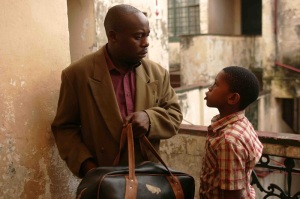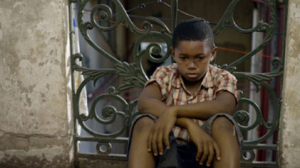By James Teitelbaum.
Durban is the third-largest city in South Africa, and is the biggest port town on the continent’s Indian Ocean coast. Although about half of the city’s population are black African and over a third of the population considers Zulu to be their first language, Durban is also home to the world’s largest population of Indians living outside of India. About a quarter of the 3.5 million people in the Durban metropolitan area are Indian. As a nation, South Africa is (sadly) well-known for the racial tensions that have plagued the country for centuries. Reports of the racist government regularly made global news reports during the years leading up to the official abolition of apartheid in the early 1990s. Even though official apartheid policies have changed in South Africa, there are multiple and completely different struggles happening on the streets of Durban to this day, such as rampant racism between Zulus and Indians.
This conflict provides context for the story of Lucky (Shile Dlamini), a young Zulu boy whose mother has died of AIDS without ever having revealed who Lucky’s father is. With no close family remaining in his tiny and remote Zulu village, Lucky travels to Durban to live with an uncle, who is befuddled as to what to do with this boy who has appeared on his doorstep. Bright and good natured, Lucky wants nothing more than to go to school in Durban, but his uncle doesn’t always have Lucky’s best interests in mind, and Lucky must soon leave the home of his only relative. With his situation seeming to be hopeless, Lucky meets Padma (Jayashree Basavaraj), an elderly Indian woman who harbors a deep-seated racism against Zulus. Padma will not handle anything a Zulu has touched, and she won’t even let Lucky sit on her sofa without putting an old sheet over it first. She speaks down to the Zulus she begrudgingly encounters, and doesn’t seem to feel much remorse about whacking any of them with her cane.
 Although separated by large differences in their age, ethnicity, gender, culture, and even language (Padma doesn’t speak a word of Zulu, and Lucky doesn’t know any English yet), a complex relationship develops between the two of them. The strength in Avie Luthra’s directorial approach is in his cautious avoidance of having Padma become “cured” of her deeply seated racism during the course of the film. Clearly, someone who has spent seventy years thinking of Zulus as “dogs” isn’t going to be swayed towards a wholly new perspective in the course of a few days. But Padma is a complex woman, and the mistrust for Zulus that comes as part and parcel of the culture in which she was raised does not preclude her from being a kind or empathetic human being at heart. Can a racist still be essentially a good person? This is one of the themes being explored here, and it isn’t as simple a question to answer as one might suspect. Padma doesn’t appear to have any friends or family, and when she finally engages in a deeply selfless gesture on Lucky’s behalf, it is as much an act of catharsis for her own losses in life as it is an act of altruism towards Lucky.
Although separated by large differences in their age, ethnicity, gender, culture, and even language (Padma doesn’t speak a word of Zulu, and Lucky doesn’t know any English yet), a complex relationship develops between the two of them. The strength in Avie Luthra’s directorial approach is in his cautious avoidance of having Padma become “cured” of her deeply seated racism during the course of the film. Clearly, someone who has spent seventy years thinking of Zulus as “dogs” isn’t going to be swayed towards a wholly new perspective in the course of a few days. But Padma is a complex woman, and the mistrust for Zulus that comes as part and parcel of the culture in which she was raised does not preclude her from being a kind or empathetic human being at heart. Can a racist still be essentially a good person? This is one of the themes being explored here, and it isn’t as simple a question to answer as one might suspect. Padma doesn’t appear to have any friends or family, and when she finally engages in a deeply selfless gesture on Lucky’s behalf, it is as much an act of catharsis for her own losses in life as it is an act of altruism towards Lucky.
Perhaps too naive to truly understand Padme’s racism, and certainly only partly aware of how significant it is that Padma has changed her thinking about his people (or at least Lucky himself), Lucky has other matters to consider, such as getting into school and discovering the identity of his father. While following Lucky on these journeys, Luthra also manages to avoid the usual cliches associated with coming of age stories. At one point or another, nearly every character in the film, including Lucky himself, tells Lucky what he needs to do in order to “become a man”. Ten-year-old Lucky’s quest for the maturity and inner empowerment required for him to take care of himself as an unwanted orphan in a dangerous society is a key theme in the film. He wants a home, he wants and education, and he wants a family, and he is determined to seek all of these things out. By the end of the story, this goal is by no means fully attained for him, but in the same way that Padma has taken one step towards changing her worldview, Lucky’s journey is also just beginning. As Lucky, Sihle Dlamini’s performance is natural and believable, and he tackles the complexities of the character admirably.
This 2011 film of Lucky is the fourth full-length feature to be directed by Avie Luthra. Although the hyper-shaky documentary-style camerawork draws attention to itself a bit too often, the film is otherwise technically proficient. However, the real attraction here is the relationship between the two leads, as their unlikely bond moves into unexpected directions, while Lucky uses his wits and courage to find meaning in his young life. The DVD edition from Film Movement also contains Luthra’s twenty-minute short film version of Lucky from 2005. The short essentially tells the first twenty minutes of the feature film version, but with a different cast. It is interesting as a companion piece to the feature.
James Teitelbaum is a media arts professor in Chicago. He has been writing film reviews for about a decade, and is the author of four books, including Destination: Cocktails (2012), and Big Stone Head (2009).


Thank you, James for bringing attention to this gem.
I applaud Film Movement for their continued efforts to release small but significant (and often deeply moving works) such as this film.